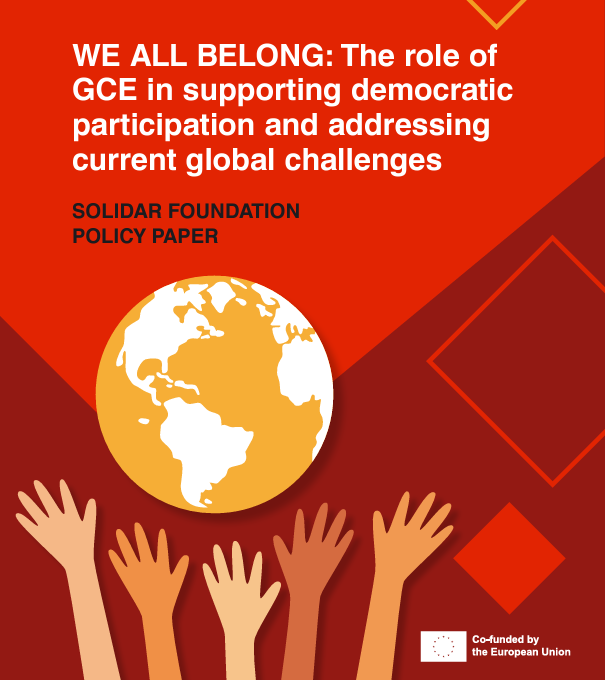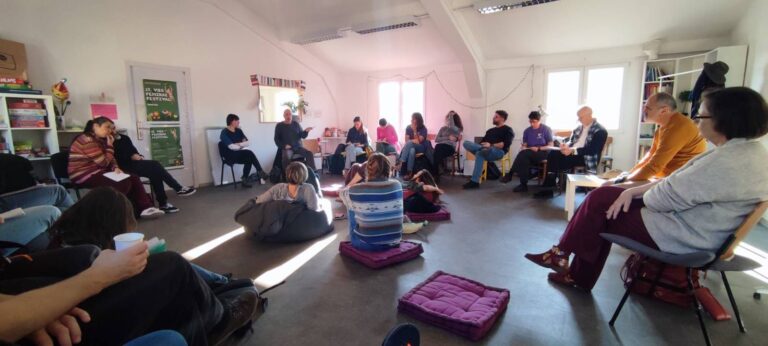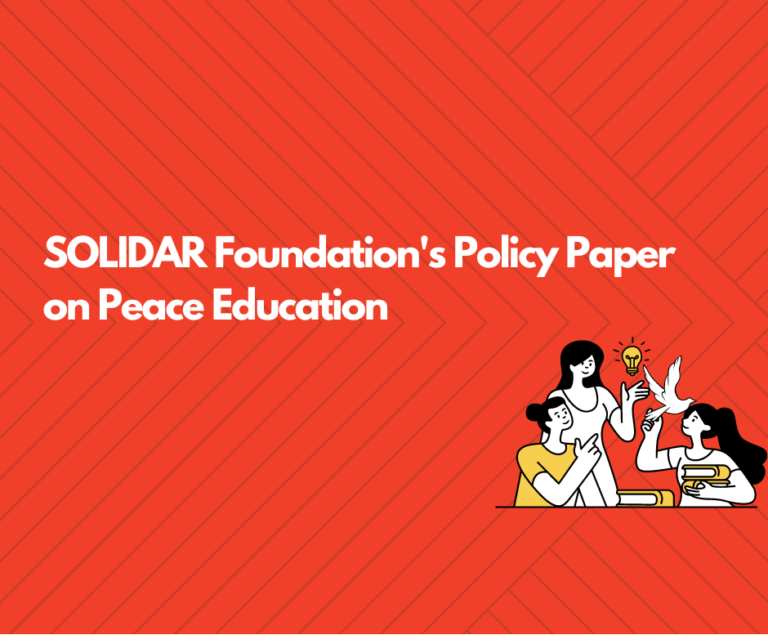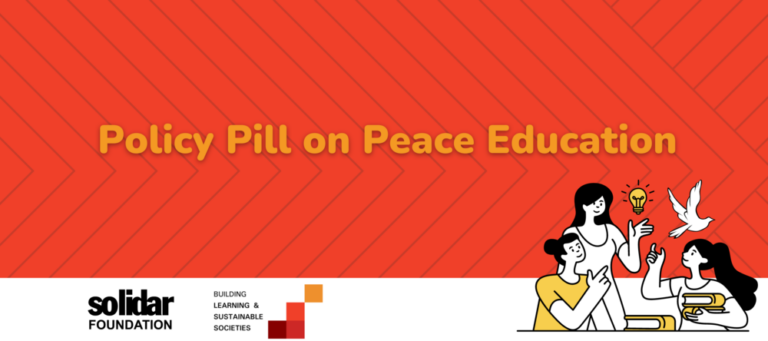Peace Education as a Lifelong Learning Means to European Democracy
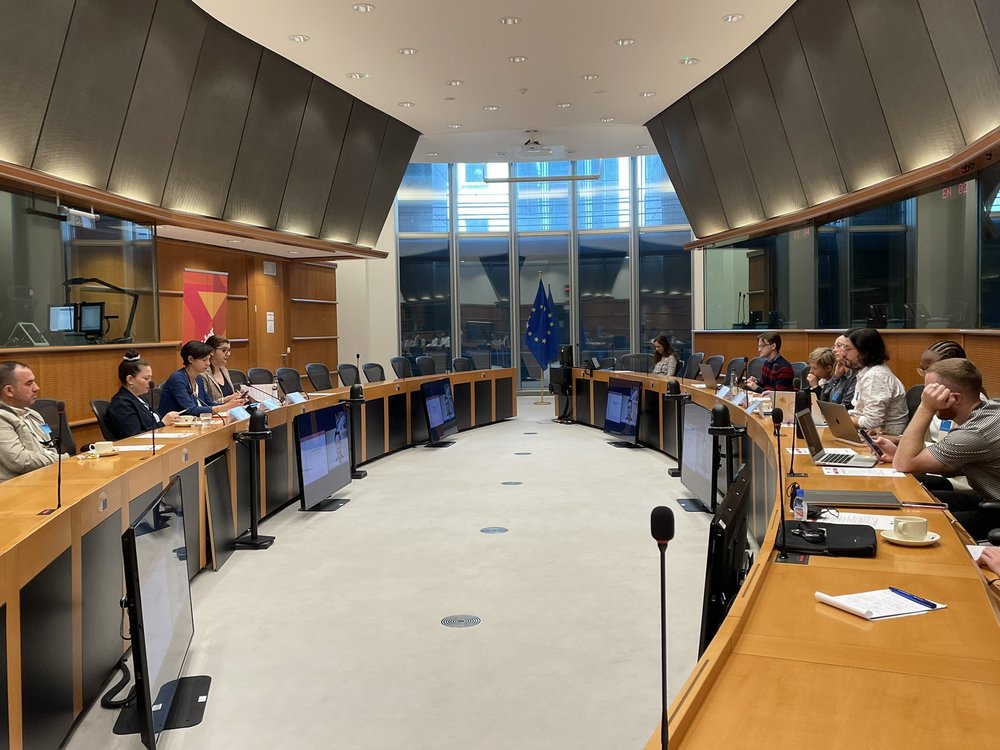
On June the 15th, SOLIDAR Foundation launched its annual work on the topic of Peace Education and notably on the role of non-formal and informal learning for the citizenry to develop the competences that are needed to advance democracy in our societies. At times of warfare on European soil, the long-standing work of our members in this field across the continent becomes the more relevant for a reflection on policies that can foster the development of the transversal skills for achieving democratic societies in Europe.
Policymakers and experts such as MEP Victor Negrescu (S&D, vice chair of the CULT Committee) and Katerina Toura from DG JUST but also Ruba Hilal from the International Falcon Movement, gathered in the European Parliament to engage in a compelling discussion with members of SOLIDAR Foundation as well as their partners. Their contributions and those of all participants will feed in the research eventually resulting in a policy paper that will paper to be released in the autumn.
While the research has just started, the testimony of our members from Croatia, the Centre for Peace Studies represented on this occasion by Lana Jurman, points towards the added value that Civil Society Organisations bring to the attainment of democratic and peaceful societies. Based on 25 years of experience in organizing courses for peace studies for “restless young citizens”, they underlined the importance of acknowledging the different dimensions and understandings of conflict and thus the need for an all-encompassing but targeted approach to peace education. Participants in the peace studies courses identify the injustice of the world and would like to obtain the tools needed counteract it, therefore, the course grew over the years into a interdisciplinary programme that combines research with public actions, public policy and advocacy.
In the frame of the course, CPS collaborated 11 years ago with the Institute for Social Research in Zagreb on a piece of research that would assess the possibility to include peace education in formal education in Croatia. The outcomes of this work were that peace must be included in a cross-curricular manner in formal education, across social sciences-related subjects, while also an extra-curricular component needs to be provided in partnership with the civil society and while a stand-alone subject for peace education should still be established. Given this requirement, CPS proceeded to promote quality civic education as the umbrella under which peace education can be promoted. Lana explains that the definition used for peace education qualified the subject as values education that develops a culture of peace, promotes equality, socially just relations, sustainable community developments as well as active and responsible citizens. The non-formal education programme CPS proposes aims to do just that, focusing on human rights, discrimination policies while combining theory and practice. The goal of the course is to promote Johan Galtung’s vision of a positive peace, which radically transforms values and the social order so that each human being can fulfil their potential.
Acknowledging the great value of such initiatives, MEP Victor Negrescu, vice chair of the CULT Committee from the S&D Group, highlighted the existence of work on peace education within the European Parliament’s CULT Committee while referring to its scope as the participation of European citizens at global level in efforts for promoting peace, stability, tolerance, respect and the broader EU values. The goal is defending them and promoting them abroad to ensure a stable environment within and beyond the borders of the EU and to this end, he shared that school curricula needs to be revised, to include more aspects on the relevance of tolerance, history and debate/dialogue, promoting hard and soft skills connected to this. He underlined the fact that peace represents a way to live in harmony, ensuring that communities living close by are getting along and thriving and that non-formal and informal education can be a way to achieve this. SOLIDAR Foundation welcomed his invite to further cooperate in developing recommendations linked to peace education that the CULT Committee can promote in relation to the European Education Area.
Katerina Toura, Policy Officer at DG JUST working on the EU Anti-Racism Action Plan 2020-2025, shared a call for expanding the work on peace education and combatting racism outside of formal education, ensuring a lifelong learning perspective for this and emboldening CSOs and stakeholders to collaborate on addressing these challenges. She presented the main initiatives that the EU has launched to combat discrimination and in so doing promote peace education, such as the findings from the EU minorities and discrimination survey implemented by the European Union Agency for Fundamental Rights, but also the Race Equality Directive which represents the first port of call, with the European Commission being committed to combat all forms of racism in education and beyond through policies and funding. At the same time, she stressed that inclusion and fairness are mainstreamed as priorities within the European Education Area, expanding also to the digital realm via the updated Digital Education Action Plan. The European Solidarity Corps programme serves also to support activities combatting racism, while the Citizens, Equality, Values and Rights (CERV) programme provides financial support to Member States’ authorities, civil society organisation and national organisations, amongst others, to address racism, xenophobia and discrimination, including with regards to lack of access to education. Finally, Katerina invites participants to look at the Council of Europe’s European Commission against Racism and Intolerance (ECRI)’s Policy recommendation no. 10 on combatting racism and racial discrimination in and through school education to identify also the requirements in terms of training the members of the teaching profession to work in multicultural environments. It also considers racism in the process of teaching history, including colonialism and its permeating legacy in learning by means of revising curricular content and revising history education to eradicate stereotypes. Without decolonizing history, it is difficult to understand contemporary societies.
While the role of the round table discussion was to feed the upcoming research rather than reaching immediate conclusions, there are important takeaways that can already inform the advocacy of SOLIDAR Foundation and its members and partners. In this sense, the main lesson learned is that multi-level action and interaction are needed for a policy framework that can enable practices, facilitate exchanges and ensure that formal, non-formal and informal education providers are collaborating.


